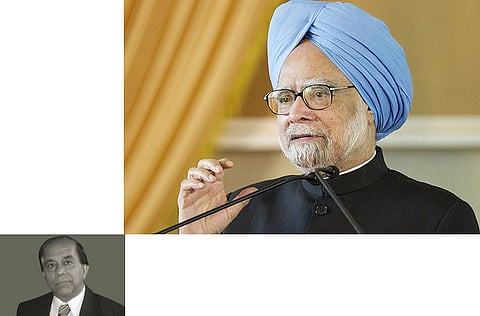Slay the hydra called graft
Singh should show his resolve to combat corruption by agreeing to the ombudsman or the Lokpal

Although generally admired for his honesty and eruditeness, Indian Prime Minister Manmohan Singh’s image in the eyes of the financially powerful and influential Indian diaspora in the United States has eroded following the series of scandals that have rocked India’s political landscape.
The diaspora has been closely following the unfolding of the “Indian spring”, with Anna Hazare and Baba Ramdev spearheading the non-parliamentary opposition that seeks to eradicate corruption and punish plunderers and thieves amongst politicians and bureaucrats.
Indeed, some Indians in the United States have staged dharnas or fasts to protest against India’s corruption culture that is crushing the average middleclass Indian with limited income.
Many US-based Indians say that Singh’s long silence and slow action against corrupt politicians and bureaucrats make him, unwittingly, an accessory to the widespread corruption.
The Indian diaspora is alarmed by the language and lack of civility on the part of Congress politicians such as Digvijay Singh, Kapil Sibal and Pranabh Mukherjee who called Baba Ramdev and Anna Hazare “thugs”, “self-appointed messiahs”, etc.
Amnesty International questioned the need to evict Baba Ramdev from Delhi while addressing a large gathering of his followers. The diaspora’s view is that the Indian government was wrong to have forcibly expelled Baba Ramdev, violating his rights in the capital of a country which, ironically, touts itself as the world’s largest democracy.
Another source of irritation is what the diaspora calls Singh’s “infatuation” with Pakistan. While the diaspora favours peace with Pakistan, it wants the latter to demonstrate its earnestness to live in harmonious coexistence. Pakistan should bring to justice those who masterminded the horrifying November 26 terrorist attacks of Mumbai.
Singh’s eagerness to seek a dialogue with Pakistan at any cost was a strategic mistake that could send the wrong signal to that country.
The Congress party – the party of Mahatma Gandhi and Pundit Nehru - has, sadly, become the political home of sycophants and cronies with little interest in nation building. The opposition BJP is not any better; it has also been mired in scandals and problems.
Singh should demonstrate his resolve to combat corruption and other ills in the country by agreeing to the ombudsman – the Lokpal - as proposed by Hazare and others. If corruption is not tackled at the highest level, Singh’s efforts to resolve the perennial conflict with Pakistan could be misinterpreted as an attempt to divert attention from the corruption issue which has every Indian hopping mad.
While the diaspora’s negative perception of Indian politicians and bureaucrats is coloured by unpleasant experiences with the Indian consulates and embassy in the USA, as well as by media reports about corruption scandals in India, the Indian Government can ill afford to ignore the views of the powerful diaspora that plays a vital role in promoting India’s interests in the host country.
But how do you clean up a system which for decades has been infected and eaten up by the cancer of corruption?
Singh could start cleaning up at the top first and lead by example. Arrest and punish not only those who perpetrate wrongdoings but also those who harbour and protect them. The process of accountability should be activated and strengthened.
The judiciary and agencies such as the CBI (Crime Bureau of Investigation), the police force and others should be de-politicized and made independent so that they can carry out their work in an unimpeded manner.
It is also time the gullible Indian voters critically examined the credentials of politicians before voting for them. India’s politically dormant middle-class could play a pro-active role here.
Indian businesspeople should realize that India’s economic growth trajectory could be affected if the foreign investment inflow slowed down or even stopped because of rampant corruption.
Indeed, several foreign executives recently told me in private conversations at the world’s largest steel conference in New York that corruption, if unstopped, could derail India’s economic progress.
The ominous words uttered seven decades ago by former British premier Winston Churchill, who opposed India’s independence from British rule, could come true: “Power will go to rascals, rogues, freebooters … all leaders will be of low calibre and men of straw … they will have sweet tongues and silly hearts … they will fight amongst themselves for power and the two countries (India and Pakistan) will be lost in political squabbles.”
Corruption, the multi-headed hydra, needs to be slain.
Manik Mehta is a commentator on Asian affairs.


